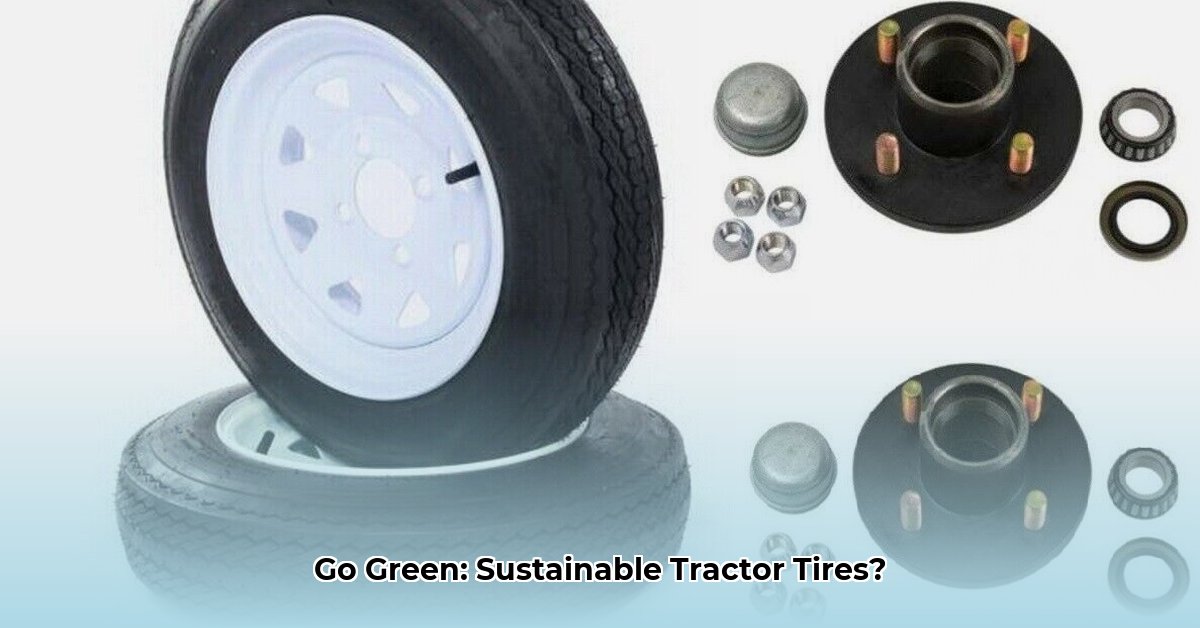
4.80-12 Trailer Tire 5 Lug Tractor Supply: Sustainable Farming Practices
Choosing the right 4.80-12 trailer tires with a 5-lug setup from your local tractor supply store is crucial for efficient farm operations. But did you know your tire choices significantly impact your farm's environmental footprint? This article explores the environmental impact of farm tires and provides actionable steps to minimize your farm's carbon footprint, focusing on sustainable 4.80-12 trailer tire options. Learn more about innovative tire solutions here.
The Environmental Impact of Farm Tires: A Hidden Cost
Farm tires, seemingly simple products, have a surprisingly large environmental impact. Their production consumes considerable energy and resources, leading to significant waste generation. Disposal at the end of their lifespan further contributes to environmental concerns. Landfills, for example, are often cited as a significant source of environmental pollution from disposed tires. Isn't it alarming to consider the amount of waste generated from just one farm alone?
The increased use of heavy machinery in modern agriculture has increased the demand for heavy-duty agricultural tires, which require significant energy and resources to produce. This adds to the already considerable environmental burden of conventional agricultural tires. But what’s the alternative?
Immediate Actions for Improved Sustainability
Before investing in new eco-friendly tires, consider these immediate actions:
Implement Tire Pressure Monitoring Systems (TPMS): Maintaining proper tire inflation significantly reduces fuel consumption and extends tire lifespan. TPMS provides real-time tire pressure data, allowing for quick adjustments and preventing underinflation which can lead to premature tire wear and reduced fuel efficiency. This straightforward investment enhances both your budget and environmental performance.
Explore Tire Retreading: When feasible, retreading suitable tires provides a cost-effective and sustainable alternative to replacement. This extends tire lifespan, reducing waste and saving money. This is a short-term solution, yet crucial to implement while considering more sustainable long-term solutions. However, safety remains paramount; only retread tires meeting the highest safety standards should be considered.
Long-Term Strategies for Sustainable Farming
For substantial, long-term sustainability, consider these strategies:
Embrace Sustainable Tire Materials: As the market develops, seek out tires manufactured with eco-friendly materials like bio-based rubber or recycled rubber. While often more expensive upfront, the long-term environmental benefits and potential for lower running costs might outweigh the initial investment.
Prioritize Lower Rolling Resistance Tires: When purchasing new 4.80-12 trailer tires, prioritize those boasting low rolling resistance. This significantly improves fuel efficiency over the tire’s lifespan. Even small improvements can accumulate into major savings and significant environmental benefits over time.
Comparing Conventional and Sustainable Tires
This table provides a general comparison:
| Feature | Conventional Tire | Sustainable Tire |
|---|---|---|
| Initial Cost | Generally Lower | Usually Higher |
| Fuel Efficiency | Lower | Significantly Higher |
| Environmental Impact | Higher | Lower |
| Tire Lifespan | Variable | Potentially Longer; depends on use. |
Remember, specific details vary between tire models. Check with your local tractor supply store or tire retailer for model-specific performance data.
The Future of Sustainable Agricultural Tires
Government regulations and technological advancements are constantly reshaping the future of sustainable tire production. Future legislation may introduce incentives for eco-friendly materials and responsible tire disposal. Staying informed about these developments is crucial for making responsible purchasing choices. What innovative solutions are you anticipating in this growing sector of sustainable agriculture?
Key Takeaways:
- Improper disposal of agricultural tires creates significant environmental hazards, including groundwater contamination and greenhouse gas emissions.
- Recycling and repurposing tires are viable alternatives, but careful consideration of potential environmental impacts is crucial.
- Extending tire lifespan through proper maintenance is a fundamental step towards sustainability.
- Investing in on-farm tire reuse requires thorough risk assessment.
- Collaboration among farmers, tire companies, and governments is critical for creating a truly sustainable agricultural system.
“Proper tire maintenance is not just about cost savings; it's about environmental stewardship,” states Dr. Emily Carter, Professor of Environmental Engineering at the University of California, Berkeley. "Extending the life of your tires directly translates to a reduction in the environmental impact of your farming operations."